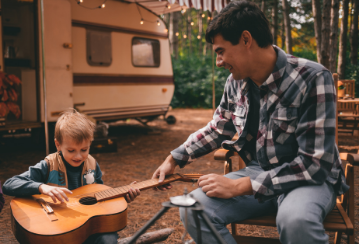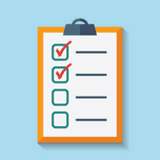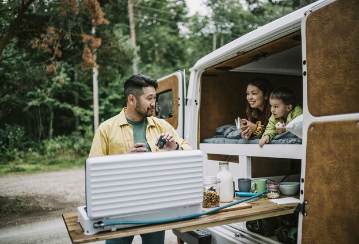News and Updates
7 tips for planning a successful RV vacation
Motorhomes and trailers are a great way to enjoy camping with more comforts than a traditional tent provides. If you are not familiar with motorhome and trailer camping, here are a few tips for planning your summer getaway.
1. Determine the right RV for you
There are several different types of motorhomes and trailers to choose from, and you will want to choose an RV based on the number of campers, your driving experience and your budget. Most RVs can be driven with a G license, as long as the combined gross weight is less than 11,000kg and, if towing a trailer, the trailer is not more than 4,600kg.1
Class A RVs are the largest motorhomes and resemble a bus. They have more space to offer but their size can make them harder to handle and limit the campsites you can access. Class B RVs, also known as camper vans, are typically a full-size or extended van with a raised roof that drives like a standard automobile – a good option for solo travelers or couples. Class C RVs are built on a truck chassis and have an extra cab over the driver’s compartment, making them a good middle option for people wanting a little more space in a vehicle that’s easier to drive.
There are many different trailer options as well. From larger fifth wheels to smaller pop-up trailers and travel trailers, trailers give you the flexibility of unhitching your vehicle for day trips away from your campsite.
2. Take it for a spin
 If you are new to driving larger vehicles or towing a trailer, get some practice before you hit the road with the whole family. Before renting an RV, ask the rental location if you can take it for a test drive. Practice parking, making wider turns and giving yourself more time to stop when braking. When backing up, always use a spotter. Lastly, remember to take it slow as many RV accidents are caused by excessive speed.
If you are new to driving larger vehicles or towing a trailer, get some practice before you hit the road with the whole family. Before renting an RV, ask the rental location if you can take it for a test drive. Practice parking, making wider turns and giving yourself more time to stop when braking. When backing up, always use a spotter. Lastly, remember to take it slow as many RV accidents are caused by excessive speed.
3. Read the manual
When working with a new vehicle or trailer, it’s important to read the manual before you head out on your trip. The manual will give you instructions on how to work electricity, water and sewer hookups, dump waste, and safely operate your vehicle. We recommend you wear latex gloves when dumping waste, as it can get messy.
4. Plan out your sleeping arrangements ahead of time
If an RV says it sleeps six people, don’t just take that at face value. Learn where all the beds are as well as their sizes, so you have appropriate sleeping quarters for everyone on the trip. Not having a comfortable place to sleep is a sure way to make a grumpy camper!
5. Secure everything in the RV before driving
When cruising down the highway or driving down bumpy campground roads, any item that isn’t secured has the potential to shift and fall. Before you depart, be sure to clear off counters, latch cabinets and safely stow all loose items.
6. Make your packing list and check it twice
If you are renting a motorhome or trailer, there may be some items included in your rental or available for an extra fee. Review what comes with the rental and make note of everything else you must pack. Remember to include supplies to cook your meals and store your food, bedding, clothes, a first aid kit, camping chairs, sunscreen, bug repellant, and flashlights and lanterns for nighttime.
7. Make sure your RV is covered by insurance
Whether you buy or rent, you will want to make sure your motorhome or trailer is fully covered for whatever may happen. When renting, part of the rental agreement will include insurance coverage for the RV. Review the coverage included in the agreement before renting the RV.
If you are buying an RV, you will need to purchase additional coverage through your car insurance provider. Although some car insurance covers trailers when they are being towed, it won’t cover any damage that may happen when the trailer is unhitched, such as theft or damage that might occur in your driveway. Talk to your insurer about adding motorhome or trailer coverage to your existing auto insurance policy - you may be eligible for a bundling discount.
If you are interested in getting a quote for motorhome or trailer insurance, call an OTIP broker today at 1-833-494-0085. If you have questions about adding an RV to your current insurance policy, call 1-833-615-9329.







